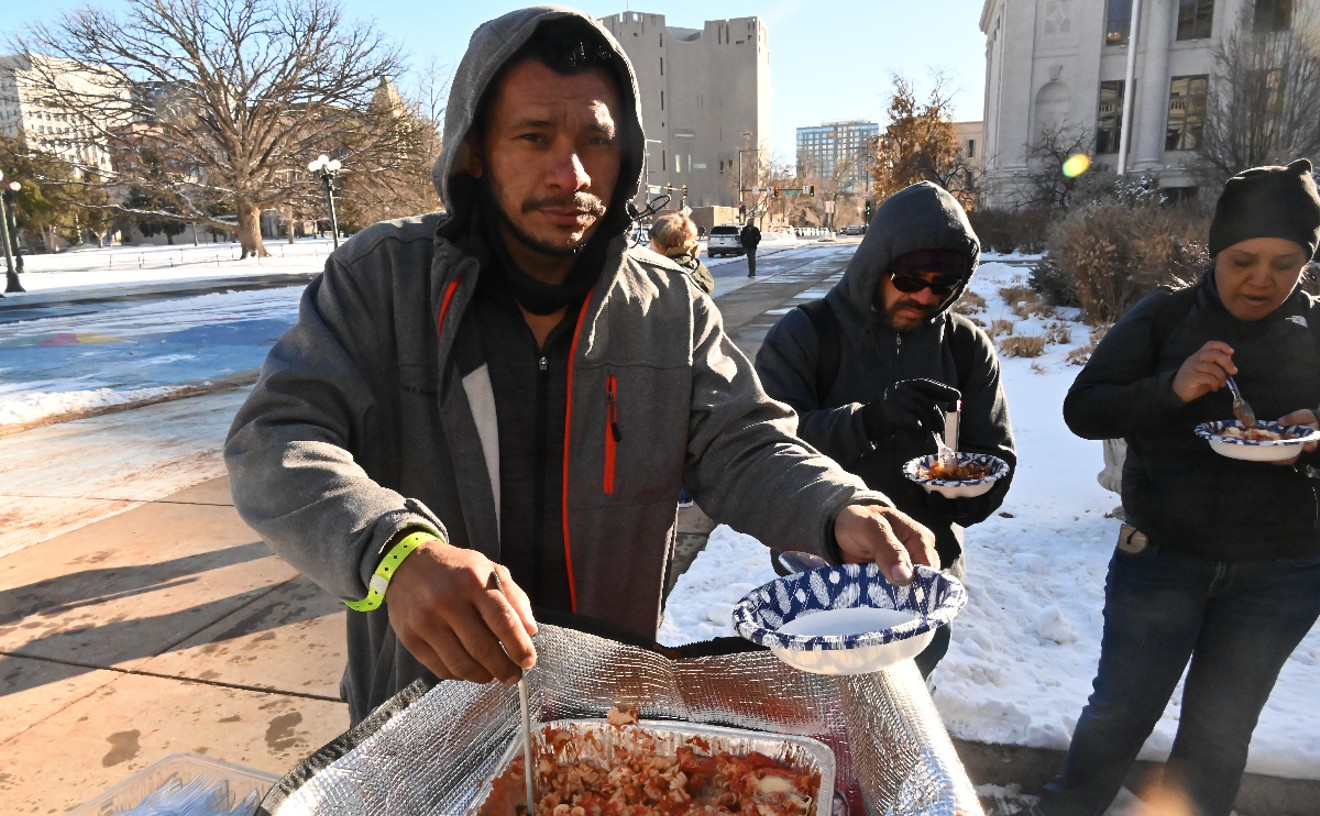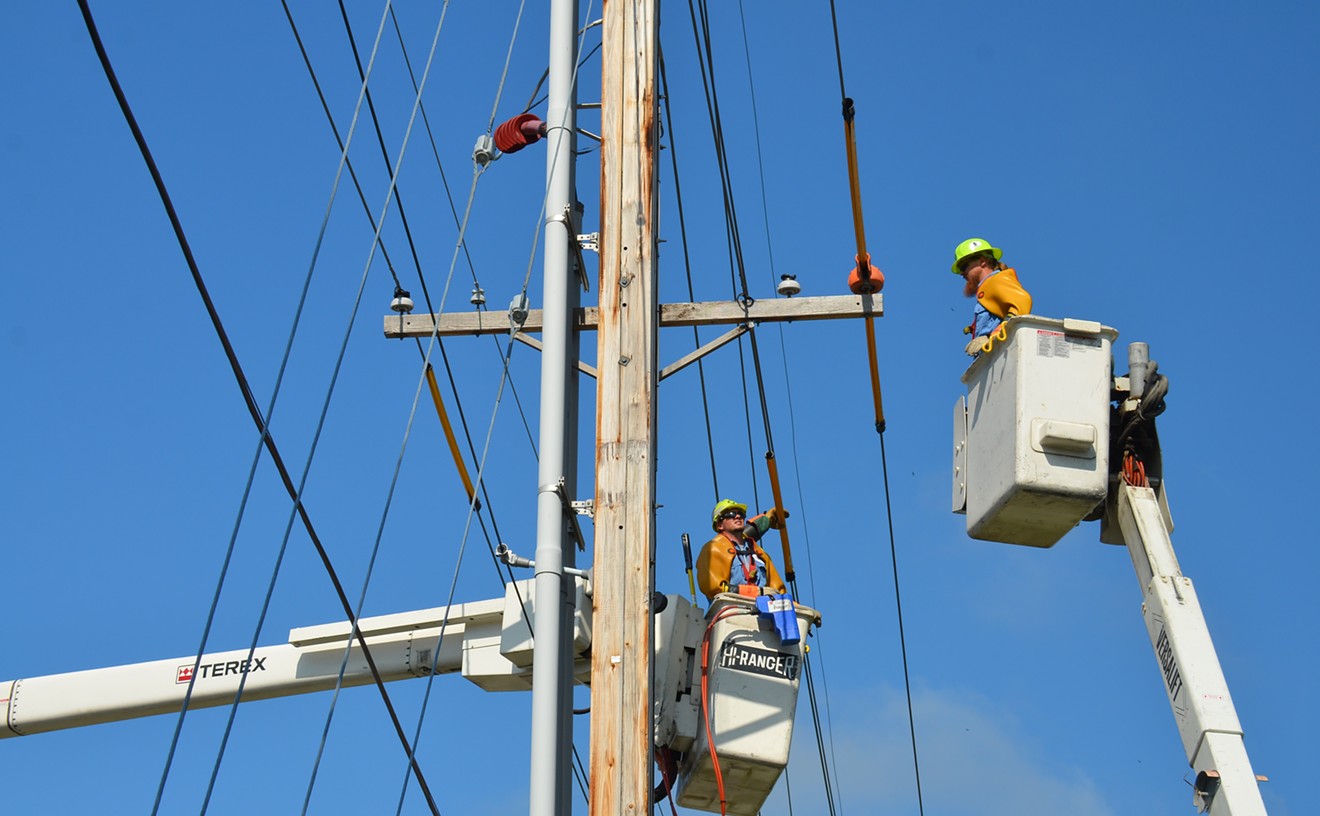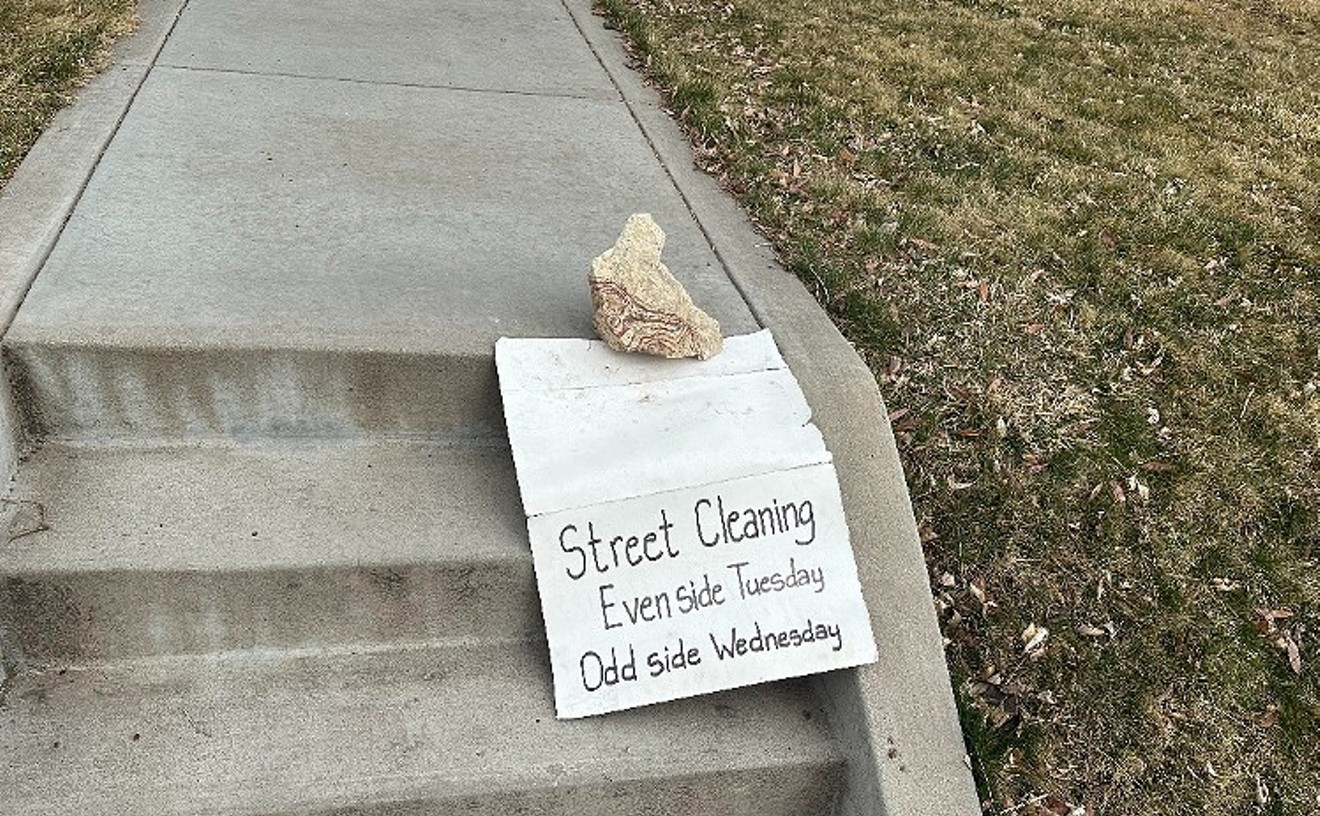Sometimes, though, a rapper can make a large impact with small equipment, as Denver's Bass Ghost found out firsthand. Along with fellow emcees Panda, Scrap Dog and Vin¢ (pronounced "Vin Cent"), Bass Ghost created Skyjack Radio, a thoroughly illegal FM station that blared hardcore hip-hop for about a month before coming to the attention of the Federal Communications Commission, which pulled the plug in mid-November. During its life span, Skyjack was the talk of Denver's hip-hop community, yet the gear that sent its signal across much of the metro area is incredibly modest: two black boxes the size of many toasters, and a simple, six-foot antenna.
"People can't believe it when they see it," Bass Ghost says. "They can't believe how little it is."
Skyjack's mother ship is just as unimposing. Bass Ghost and his comrades ran their enterprise from a southeast Denver apartment marked by the most basic accoutrements: a couch, a TV, a few chairs and a poster of Al Pacino from the movie Scarface. The broadcasting boxes, surrounded by a scattering of CDs, fit on a coffee table with plenty of room to spare, while the antenna points toward a balcony on which it was mounted before the FCC visited. In a nearby corner is a satellite dish still in its cardboard shipping container. "I didn't want to put that up with the antenna out there," Bass Ghost explains. "I didn't want anyone to think something was going on."
There might not have been if Bass Ghost had found more support for his own music. A native of New Jersey who was raised in West Palm Beach, Florida, he came to Denver in 1990 and instantly tried to stake his place in the local rap scene, which was then in its germinal stages: "There were only three groups, and I was one of them," he says. To make matters worse, Bass Ghost notes, few area venues booked local hip-hop acts -- "Skate City was about it for a long time" -- and the majority of media outlets were even stingier. Boulder public-radio station KGNU offered a Sunday-night rap show, Eclipse, and TV programs such as Rhythm Visions, seen on Channel 12, and Hip-Hop Madness, available to those with the Denver Community Television system, did what they could, but KS-104 (now KS-107.5), the city's most powerful urban-music purveyor, essentially ignored any hip-hopper with a Colorado background.
"We gave them ten, twenty CDs over the years, and they never played them once," Bass Ghost says. "We did everything to get our music played. We even offered to pay them to play it and they wouldn't do it."
"Frustrating," mutters Panda, who came to Denver in 1994 from the Louisville, Kentucky, neighborhood that spawned Muhammad Ali. "That's what it was -- frustrating."
But Bass Ghost and Panda refused to move, even if other locations were friendlier to hip-hop. "We're trying to pioneer hip-hop in Colorado," says Panda, who calls his form of hip-hop "Mountainous Music."
"We don't want to follow trends," Bass Ghost emphasizes. "We want people to follow our trends."
Getting their voices heard wasn't easy. Bass Ghost and Panda sold CDs on the street (thousands of them, they claim) and gave them away to those they thought might assist them, including A.J. McLean of the Backstreet Boys, whom they buttonholed outside one of the group's Denver appearances. "He's from West Palm Beach, so we thought that would help," Bass Ghost notes. "He said he liked our stuff and promised to call us, but he never did."
After exchanges such as these, Bass Ghost and Panda found themselves fantasizing about having their own radio station, so they could get airplay without relying on boy-band members for help. But the dream took on a more tangible form in April, when they traveled to Miami and hooked up with a friend who runs two pirate-radio stations in the city. Outlets like these are fairly common in Florida: As documented by Miami New Times, one of Westword's sister papers, there are often a dozen or more pirate outfits on the air in the city at any given time. The result is a wild atmosphere that turned nasty in September 2001, when an amateur jock known as "Uncle Al" Moss was murdered, possibly by rival broadcasters upset about signal interference.
Bass Ghost admits that Miami pirates can be ruthless: "Out there, they cut into stations, going over their signals. They don't care." But for the most part, he says, they co-exist peacefully. "They're everywhere -- and when the FCC sends them a letter to shut down, they just move to another place on the dial and keep on doing it."
Upon their return to Colorado, Bass Ghost and Panda did some investigating and learned that they could purchase everything they needed to start their own pirate station via mail order for around $1,500. Excited, they assembled "a crew of about fifty people and told them what we wanted to do and how much money we needed," Bass Ghost says. "But they thought we were bullshitting them. They thought we were out of our minds." In the end, the only folks to aid Bass Ghost, Panda, Scrap Dog and Vin¢ were a handful of area rappers who wish to remain anonymous. Bass Ghost says they were eager to help any project that might gain them some much-needed exposure.
The antenna and the first half of the broadcasting kit arrived in October. That meant Bass Ghost had to settle on a frequency, and after driving around the city twisting the knobs on his car stereo, he chose 88.1 FM. "It seemed like the cleanest one in town," he notes, and he's right. Colorado Christian University owns a construction permit for 88.1 FM, but nothing's there at present. Moreover, the closest station (excluding KRMA/Channel 6, which simulcasts the audio portion of its TV programming on 87.75 FM), is KGNU, at 88.5 FM, which seldom reaches downtown Denver. The odds of significantly interfering with KGNU were slim, because without the kit's second piece, they would be operating at just one watt of power.
Nonetheless, Skyjack Radio promptly turned heads in southeast Denver, partly because it aired its mix of local and national hip-hop uncut, with all the profanities left in. This was a conscious decision, Panda says. "We thought, if we're going to drop a bomb on you, we're going to drop it hard."
Just as appealing to rap fanatics was Skyjack's immediacy. Bass Ghost willingly gave out his home number to listeners and treated requests with the sort of respect they seldom receive on commercial radio these days. "Somebody would call up and go, 'You got that new Snoop Dogg?'" Bass Ghost says. "And I'd put the phone right up to the microphone and go, 'Yeah, right here,' and put it on. And people'd go crazy, 'cause they'd be like, 'Did you hear that? I stopped the radio station!'"
Word of mouth built rapidly. Panda remembers being stopped on the street by an enthusiastic acquaintance, "and the first thing he asks me is, 'Have you heard Skyjack Radio?' -- not knowing I had anything to do with it." But its listener base really blew up after Bass Ghost took delivery of the final item he'd mail-ordered -- an amplifier that boosted the station's power to forty watts. Suddenly, Skyjack, whose previous reception was best within a mile or so of Bass Ghost's apartment, was booming into far-flung suburbs such as Lakewood -- home, as it turns out, to the FCC's Denver offices.
Using gadgets that allow them to zero in on the source of radio transmissions, FCC staffers were able to pinpoint Skyjack's home base -- and after locating it, they moved quickly. At 10 p.m. on a night shortly after the amplifier's installation, Vin¢ was listening to the station when it suddenly disappeared. "I called up to say, 'Hey, change the CD,'" Vin¢ remembers, but Bass Ghost couldn't do it. Nikki Shears and Jon Sprague, a pair of electronics engineers who'd turned up at Bass Ghost's door, made sure of that.
Sprague is well-known among radio buccaneers; he twice shut down a pirate station overseen by a collective calling itself the Boulder Underground Radio Group ("The Making of a Pirate," October 4, 2001). According to Bass Ghost, Sprague wanted to seize his equipment, but Shears was less adamant. She gave Bass Ghost a written warning (complete with a threat of future fines) but let him keep the boxes and antenna after he promised not to use them again without a license.
Doing things by the book may be impossible. Over the past several years, the FCC has provided legal opportunities for individuals who want to create low-power FM stations ("Frequency Free-For-All," October 11, 2001), but the window for such applications is closed -- and even if it weren't, the Denver dial is already at capacity under current regulations. That leaves Skyjack with few options beyond arranging with an existing station to share time (an unlikely prospect) or finding some way to move onto AM. Prices are lower on the AM side, and at least one station, the current home of KNRC, will soon be on the market, as noted below. But without the backing of some awfully generous investors, Bass Ghost and company lack the resources to be considered serious bidders.
Not that they're ready to give up. "This was like feeding a pit bull some blood before you give it a steak," Bass Ghost says. "I'm like, GRRRRRRRR." Currently on the agenda is Alpine: Zenith Sagacity, a forthcoming album by Panda, and continued marketing of Bass Ghost's most recent song, "I Want a Freak." The duo also plans to assemble a CD that approximates the Skyjack experience; tentatively titled Birth of the Airwaves, they expect to have it on the market early next year. Acts wishing to be included in the project are encouraged to e-mail Skyjack at [email protected].
In the meantime, efforts are under way to huddle with others in the hip-hop arena -- including Jeff Campbell, who heads an education-oriented group dubbed the Colorado Hip-Hop Coalition -- with an eye toward resurrecting Skyjack Radio. "I think what they're doing is very positive, and I believe that in order for people to get recognized, you have to take some risks," says Campbell, who raps under the name Apostle. "The corporate-commercial media has made it virtually impossible for someone from the underground to attain a certain level of visibility, and when the playing field is unequal, you have to resort to guerrilla tactics. That's exactly what they're doing -- and that's the spirit of hip-hop."
"We want to keep the station alive," Bass Ghost adds. "Whatever it takes to put hip-hop on the map in Colorado, we're going to do it."
Shuffling the numbers: KNRC, at 1510 AM, launched earlier this year with the goal of changing Denver's talk-radio landscape ("Dialing for Differences," July 18), and it's made some progress toward that goal. Partly financed by gazillionaire Phil Anschutz through a company called Newspaper Radio Corporation, the station has evolved into a credible alternative to Clear Channel-owned properties such as KOA and KHOW and has proven it's willing to irritate powerful folks -- even Anschutz, whose dealings with troubled Qwest Communications have been debated on KNRC's Friday morning roundtable, The State of Colorado. But while more callers are ringing up the station (a relief, no doubt, for hosts such as Greg Dobbs and Enid Goldstein, who had to engage in near-monologues in order to fill time in their first weeks on the job), KNRC's audience remains on the teensy side. The station has yet to show up in the Arbitron ratings.
Nonetheless, Tim Brown, Newspaper Radio's chairman of the board and chief executive officer (as well as Anschutz's son-in-law), is confident he's on the right track, and to prove it, he's making a major investment. Less than a year after buying the station, formerly known as KDKO, for $2.7 million, Newspaper Radio has purchased another property, KCUV, a Spanish-language talk specialist at 1150 AM, for around $3 million. "It's basically a signal swap," Brown says.
Both stations have daytime power ratings of 10,000 watts, making the shift between these remarkably similar sets of digits seem illogical. However, broadcast quality becomes less reliable on the right side of the AM spectrum, where 1510 resides, than it does to its left. Just as important, 1510 wasn't allowed to transmit to much of the Boulder area because of interference issues with KCFC/1490-AM, owned by Colorado Public Radio. No such difficulties trouble 1150 AM, giving KNRC the opportunity to broaden its reach significantly.
That KCUV came on the market at all is moderately surprising, since Spanish-language radio has lately been doing more expanding than contracting. Witness the announcement late last month that Zee Ferrufino, owner of KBNO/1280-AM, popularly known as "Que Bueno," had purchased stations in Colorado Springs and Pueblo with the notion of forming a homegrown Spanish-radio group. But growing competition within the format prevented Miami-based Radio Única, KCUV's owner for the last two years plus, from gaining much traction in Denver. "This was their only station here, and they were looking to consolidate in other markets that are larger than Denver," Brown notes. "So they called to see if we were interested in the station -- and we were."
Brown's concept is to pull the plug on KCUV and upgrade the facility technically, much as was done to KDKO (to the tune of $700,000). Afterward, KNRC will move to 1150, and 1510 will be put back on the market. All the Skyjack Radio principals need is a few million portraits of dead presidents and they can be back in business.
KNRC's impending transition may well cause confusion for a station still struggling to register with Denverites, many of whom were first introduced to the outlet via election debates that informally paired it with television's Channel 4 and Channel 12. "I'm encouraged by some of the Arbitron diaries we're getting, and I think we'll make the fall ratings book -- just barely," Brown says. "But we have a big hurdle to overcome to let people know we're on the dial" -- particularly when that dial position will change a few months from now.
Even so, Brown goes on, "we're in this for the long haul. We're at mile one of a marathon, and we're going to keep plugging away."Mouse hunt: The City of Denver continues to move forward with plans to purchase the Rocky Mountain News building, at 100 Gene Amole Way, in order to put up a new jail. But if a recent memo circulated at the News is any indication, prisoners who ultimately wind up at this facility may suffer cruel and unusual punishment from vermin even worse than the usual journalistic sort.
The memo read, "Due to the ongoing mouse problem, NO food should be left in the drawers or on the desks unless it is in a sealed container. The problem is, the mice prefer real food over bait, and that is exactly what has happened in this situation. The maintenance guys have declared war on the critters, but if food is left out or accessible (and the drawers of desks are just good places to eat in peace), the individuals are essentially giving aid to the enemy."
So that's who moved their cheese...











